Songs of Akotam by George Mensah Essilfie
George Mensah Essilfie is one of Ghana’s most respected composers and choral directors. His direct and indirect influence within Ghana’s choral music community, as well as the renown he has won for himself globally, easily make him one of the most important figures to consider when attempting to understand Ghana’s serious music culture.
After a long absence from the republic, Essilfie returned to Ghana to witness the premier of Songs of Akotam, an original musical he wrote and composed in 2019. The musical was staged by Harmonious Chorale, under the stage direction of Johnson Edu and Samuel Arko Mensah, both professors at the University of Education in Winneba, as well as the choir’s founder, James Varrick Armaah. James was once a chorister and keyboardist with Essilfie’s Winneba Youth Choir, at one time Ghana’s most prominent youth choir. The event took place on Sunday 11th June at the National Theatre.
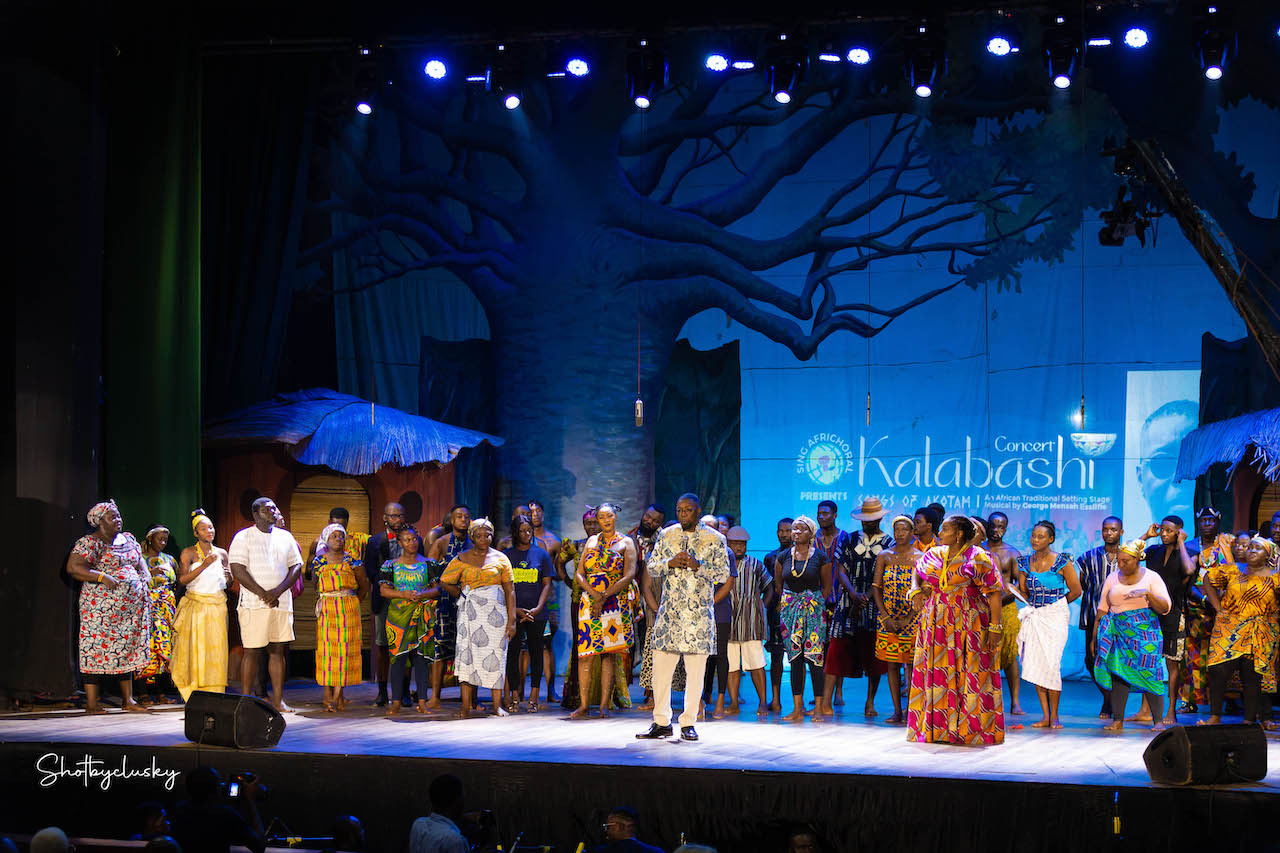
The world premier of the musical took place at the Kalabashi Concert1, the first major event organised by Sing AfriChoral, a non-profit Essilfie founded in 2019 to promote the musical arts, with a strong bias in favour of folk music and related traditions. That concert also saw a number of choirs perform works by the founder. These included the African Youth Choir from Winneba, African Glorious Chorale, The Symphonials and the Dynamic Choir.
The Musical
The story takes place in and around Akotam, a fictional Fante village, with a host of colourful characters including Okoto, the always-drunk palace messenger played by Victor Awubawuni, an amiable kooko wura, two elderly women who don’t quite fit the stereotypical village gossips/troublemakers trope, and Uncle Bobo, an old man who ends up as the butt of several jokes.2
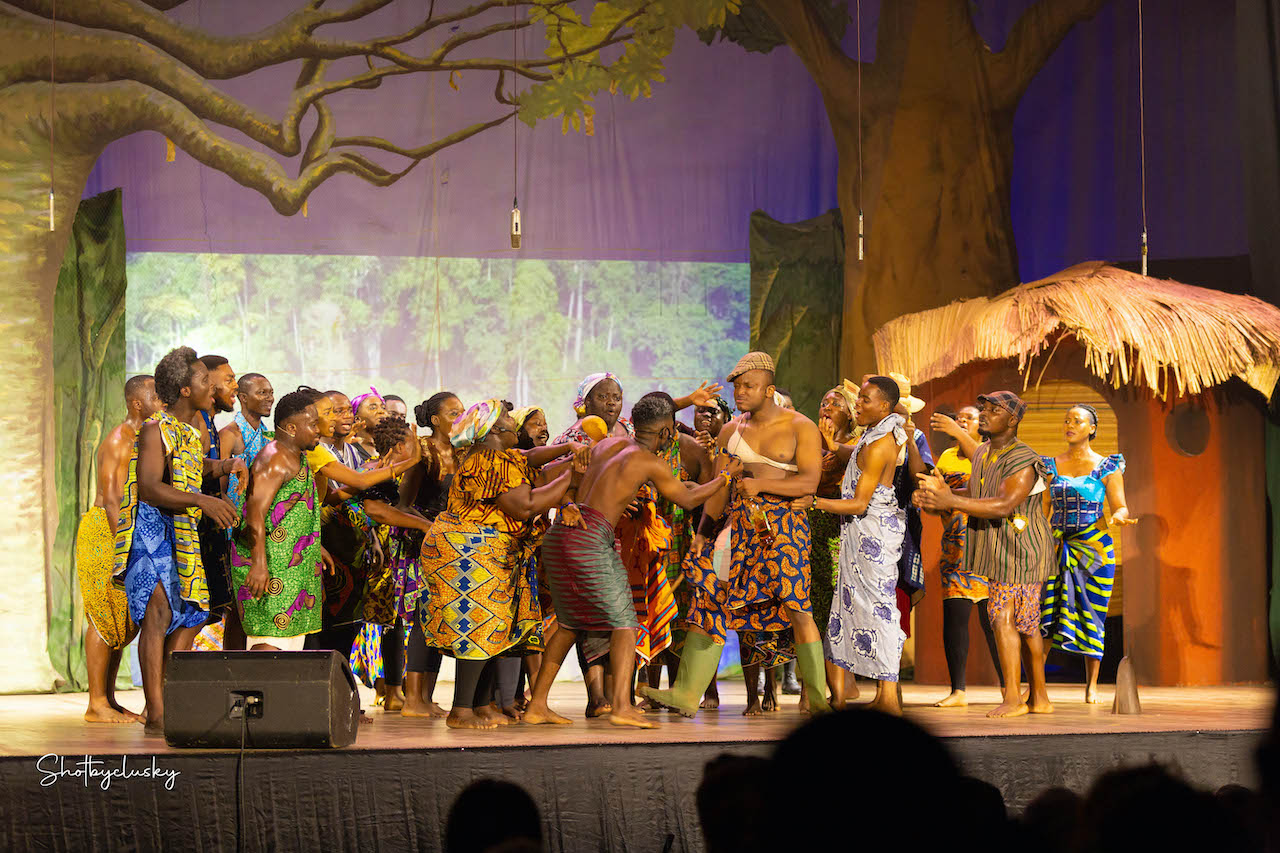
As a musical, Songs of Akotam plays in the space of the big American stage productions, with a rapturous opening complete with dance sequences featuring most of the cast singing a catchy, Broadway-esque tune. As an African musical, the distinct rhythms and motifs, as well as the orchestration of the music, provide an interesting blend of the two worlds George Mensah Essilfie inhabits.
In conversations about the work, the composer promised an eclectic mix of influences from various traditions. Sunday’s production delivered all that right from the start.
The story proper began with two storytellers setting the stage for the events that will unfold. We immediately found opportunities for the stage lighting to enhance the narrative, opportunities that were not fully exploited throughout the show. One element that was used to the fullest was the video projection from the back of the stage. The continuity between stage and screen elicited some delightful responses from the audience - proof of the strength of a mixed media production.
The fluid transition between Abokuma and her maids’ exit from the stage and their filmed trip to the riverside and back was one of several highlights of the production. Audio effects also played an important role in setting each scene. These also proved effective when they were used to enhance the character of Kakum, the story’s villain. Although they were somewhat over-the-top, Samuel Okpoti Nsiah’s interpretation of his character more than made up for it.
Songs of Akotam as a Fairy Tale
When we previewed the show on the Choral Music Ghana podcast, we spoke about the story as a fairy tale, primarily due to its simplicity and didactic intent. While we found the contrast between Essilfie’s sophisticated musicality and the rather simplistic storyline worth noting, the story is very much in line with his overarching interest in folklore, and a careful analysis reveals the fascinating detail hidden behind an unassuming plot.
A number of elements help place this contemporary tale within the larger Akan storytelling tradition, and keep it in conversation with folk-inspired narratives from around the world.
The musical establishes its moral priors early and explicitly. From the get go, we are made to understand that music is the soul of Akotam, and this positive spirit has been diminished somewhat. We also see a sharp distinction between those who love and honour this musical tradition, those somewhat apathetic to it (in the person of Okoto and Auntie Mansa’s scepticism) and the one character whose villainy is predicated on his hatred of beautiful music.
There is also a hint of foreshadowing in the opening, where Ayeyi Yaw, the hero of the story, is raised on the shoulders of his fellow villagers at a climax of the choreographed sequence, and the revelation of the power music (the moral good) has over Kakum.
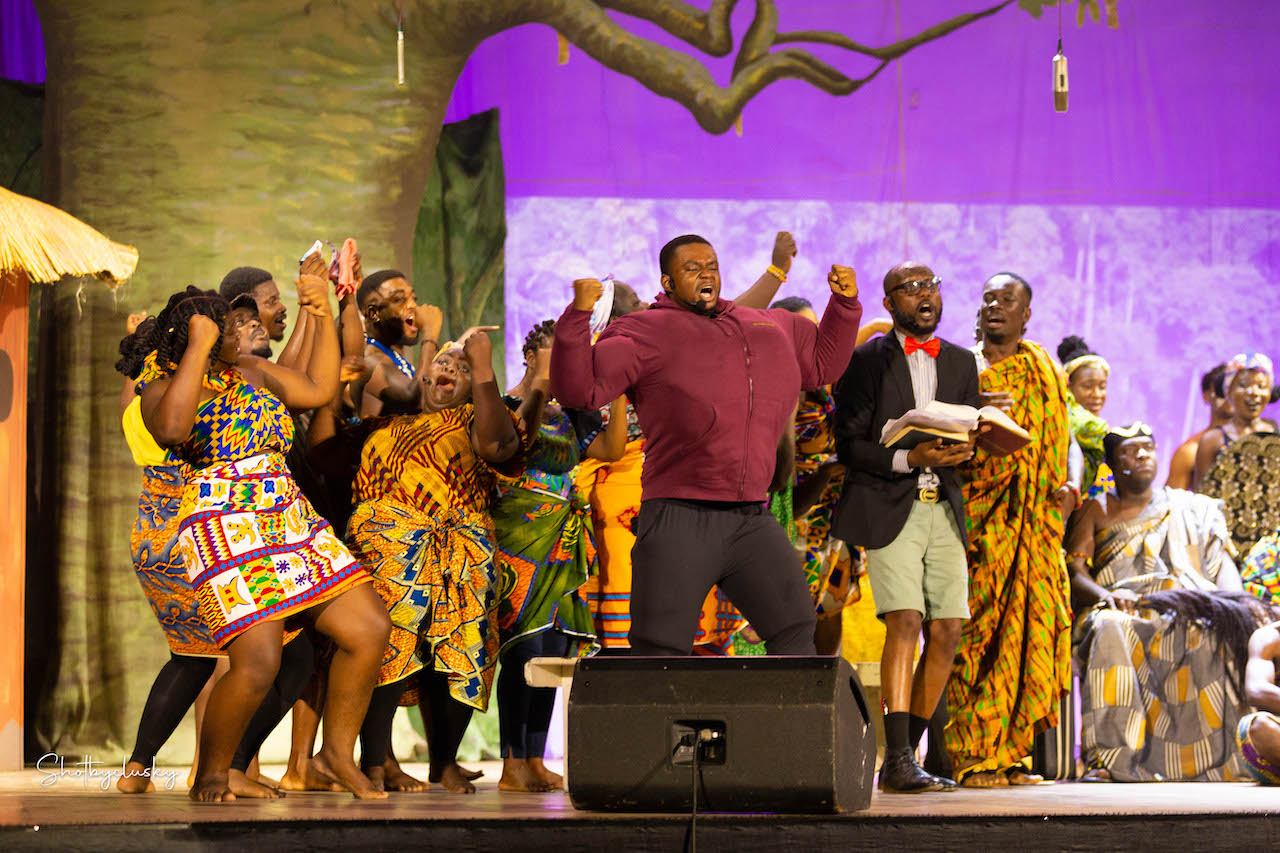
The story depends a lot on caricature and exaggeration to make its points: the three champions who respond to the king’s call to rescue his daughter are named after their defining attributes: Sika Kofi is a rich man who is always seen in an expensive cloth with money-filled briefcase in hand, Ntim Nyansa, a “booklong” professor attired like a colonial-era scholar, and Ahoɔden Mensah, a popular wrestler.
Less subtle exaggerations included the appellations with which Ateenu and Maakuba address their princess and her hard-to-miss sense of pride and command over her maids. On this point, we felt there was a character arc in Abokuma’s story waiting to be realised, but that could have weakened the main arc of this short stage drama.
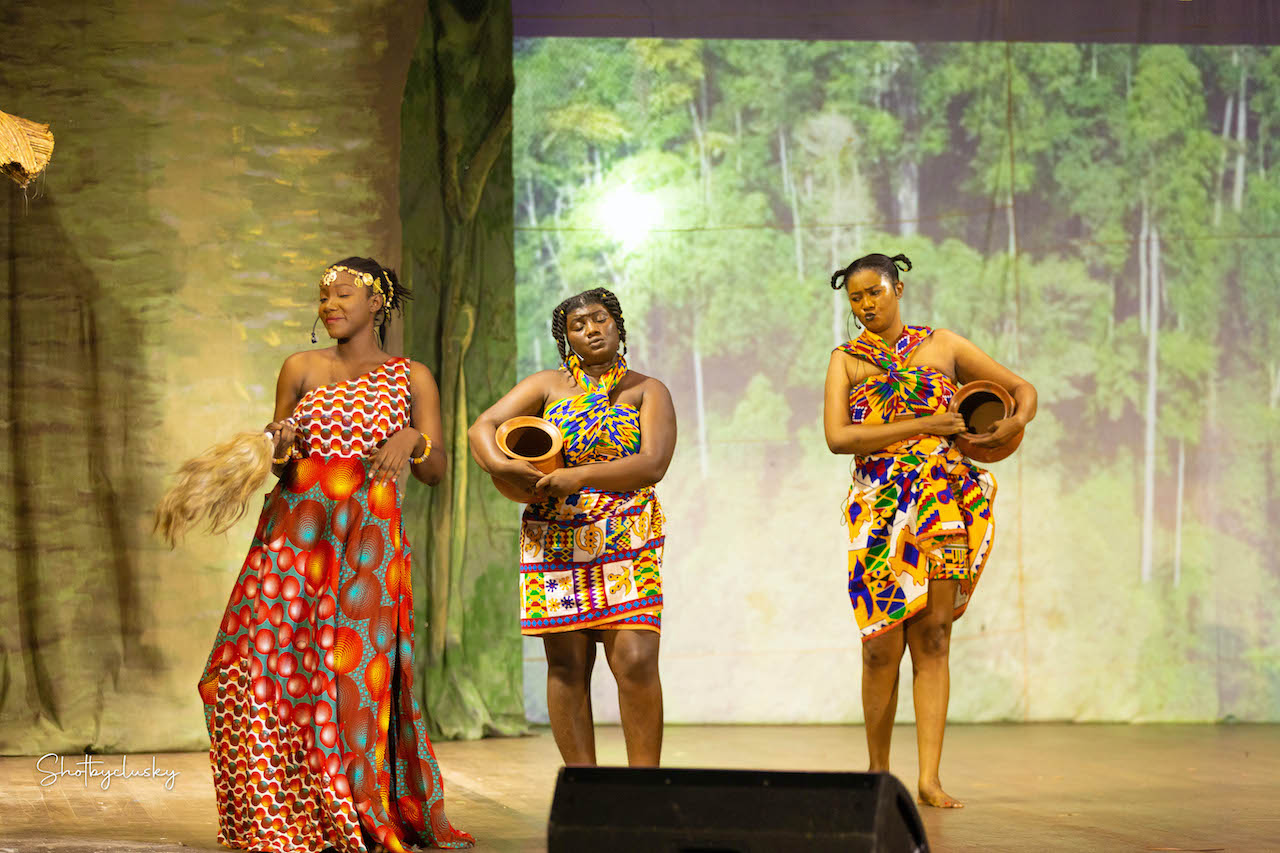
Repetition in plot and dialog - a vestige of oral storytelling traditions - also had a role to play in keeping Songs of Akotam within this genre: three maidens travel to the riverside, three champions respond to the king’s call, and are thrice defeated by Kakum. The villain of the story himself is overcome by music on three separate occasions within the scope of the story.
There were also generous amounts of “fairy tale logic” that colour the story. The framing provided by the storytellers comes with a load of premonition, providing us the solution to the problem even before it has occurred. Abokuma’s exaggerated naivete allows her to quite literally walk into an obvious trap - a fact the drunken palace messenger reflects on in the aftermath of her capture. Kakum, at his introduction, spells out to the audience the one way he can be overcome. And while sweet music is the solution to Akotam’s “Kakum problem”, all the charming music surrounding him somehow fails to take effect, the exception being Ayeyi Yaw’s song.
These somewhat contrived elements are common devices that contribute to the un-reality of the fairy tale, which exists in a world so deliberately unlike the real world that they encourage further suspension of belief to allow for even more fantastical outcomes.
Perhaps what is most striking about Songs of Akotam was the central motif - the power of music - and the specific way it was realised in the story. The idea of using music to physically overcome an enemy is an old one. In Ayeyi Yaw’s victory over Kakum, we find echoes from influences as far flung as the Brothers Grimm, and the truly ancient story of Orpheus and Eurydice, where the hero's music is used to soften the heart of Hades, who then agrees to free his wife from captivity in the underworld. JRR Tolkien also relies heavily on this motif in The Lay of Leithian, in which two villains are incapacitated by a heroine’s spellbinding singing, and to a much lesser extent in The Lord of the Rings.
Finally, as is expected of such stories, the hero lives happily ever after with his prize.
Kakum as a Tragic Figure
Our look at the Songs of Akotam will not be complete without reflecting on the crowd favourite. As a stock villain in the formulaic story, Kakum’s character risked staying flat. He is a recalcitrant young man whose poor choices lead to a spell being placed on him. His decline is furthered by an apparent lack of remorse and ultimately ends at the climax of the musical. Textual hints, as well as the humanised portrayal by Samuel, allow for more complication that enriches this character and the story as a whole.
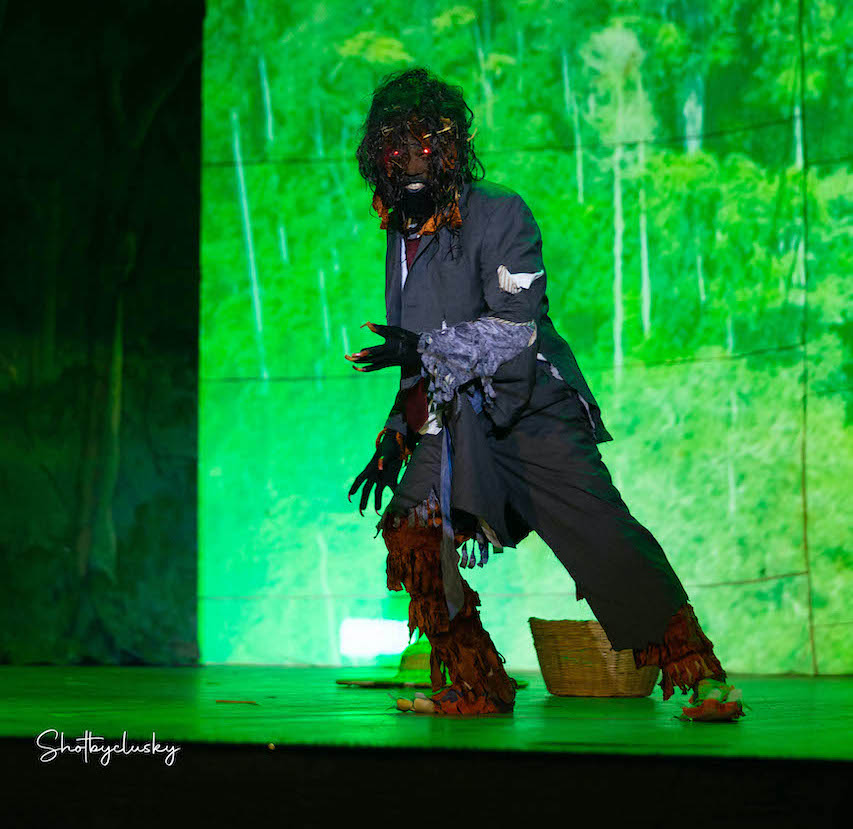
At our first introduction to Kakum, we learn that he lives in a forest between Akotam and Baaseiku. It quickly becomes clear that Kakum is an outsider, doubly so because he was a native of “the other village” before his fateful encounter.
He starts out as a physically attractive but morally questionable person whose ill-doing leads him to confront a kindly merchant. That merchant’s salvations is Kakum’s downfall; he is cursed with physical ugliness (to match his spirit, perhaps) by the power of a song. From then, resentment causes his further decline into bestiality as he recedes further from human civilisation to become a fixture in the forest.
At no point do we find Kakum rejecting a path towards repentance - the nature of the story denies him this - and from the start, we are aware that his fate is sealed. The black-and-white morality of a good fairy tale is realised in this character, and it provides a sharp edge against which the ideas of justice, good and evil in the story must be defined.
To add to this, Kakum’s figure is dominated by symbols not only of evil, but of otherness with respect to human society. He is described as a beast by the more upright characters, in spite of his very human attributes. He exists in the in-between, and so he cannot claim to belong to any one society, as none would have him. He lives in a dangerous forest with other wild animals, but he does not truly belong with them - he is, afterall, still partly human. His preferred haunt is by a river side in the evening, two old symbols of death and transition away from the light and stability of mainstream society.
When a sympathetic light is shone on Kakum, we find a misplaced person who is irrevocably homeless, who hates and is hated in return. That good music is his weakness is a profound addition to an already rich character: music is the soul of Akotam, and it comes to be its defining attribute. Kakum’s present state represents an ultimate end for a village that is slowly forgetting its musicality. By rejecting “sweet, sweet music”, Kakum’s anti-social antics reach their full realisation and he becomes the antithesis of all that Akotam stands for.
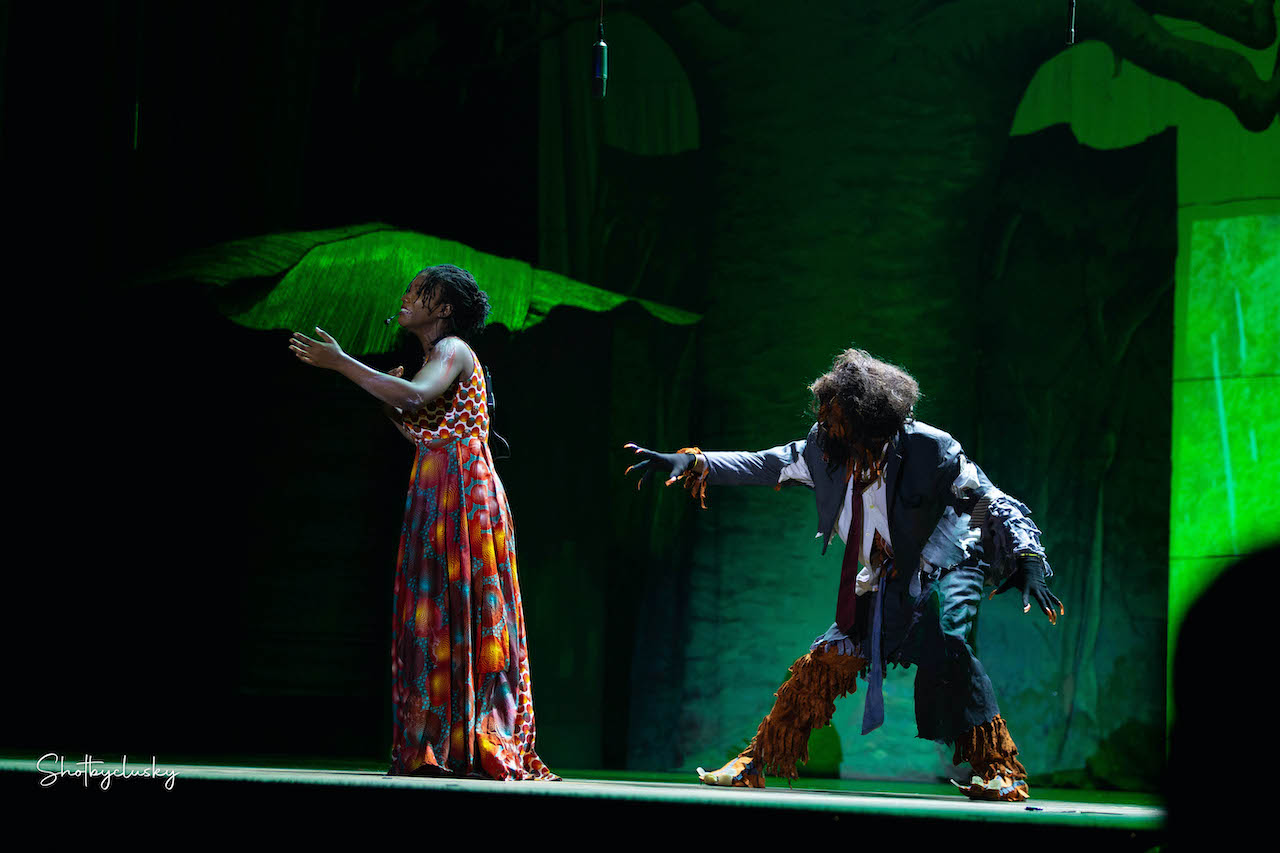
Yet his fundamental humanity is not entirely lost, and Kakum’s desire for the hand of Abokuma sparks the necessary outrage that leads the people of the village to finally deal with the problem. We can speculate that, had he been less ambitious, the incident would have been one of many unfortunate disappearances at his hand. Kakum abducting Akotam’s most prized possession is a clever stroke that puts the most villainous character in direct confrontation with the most virtuous, and it shows Essilfie’s competence as a storyteller.
Music as Identity
Songs of Akotam preaches the power of music. Throughout the musical, we are made to understand that music and dance are fundamental to Akotam’s identity. This is true of Ghanaian culture as a whole, which is celebrated for its rhythm, laid-back nature and jovial spirit.
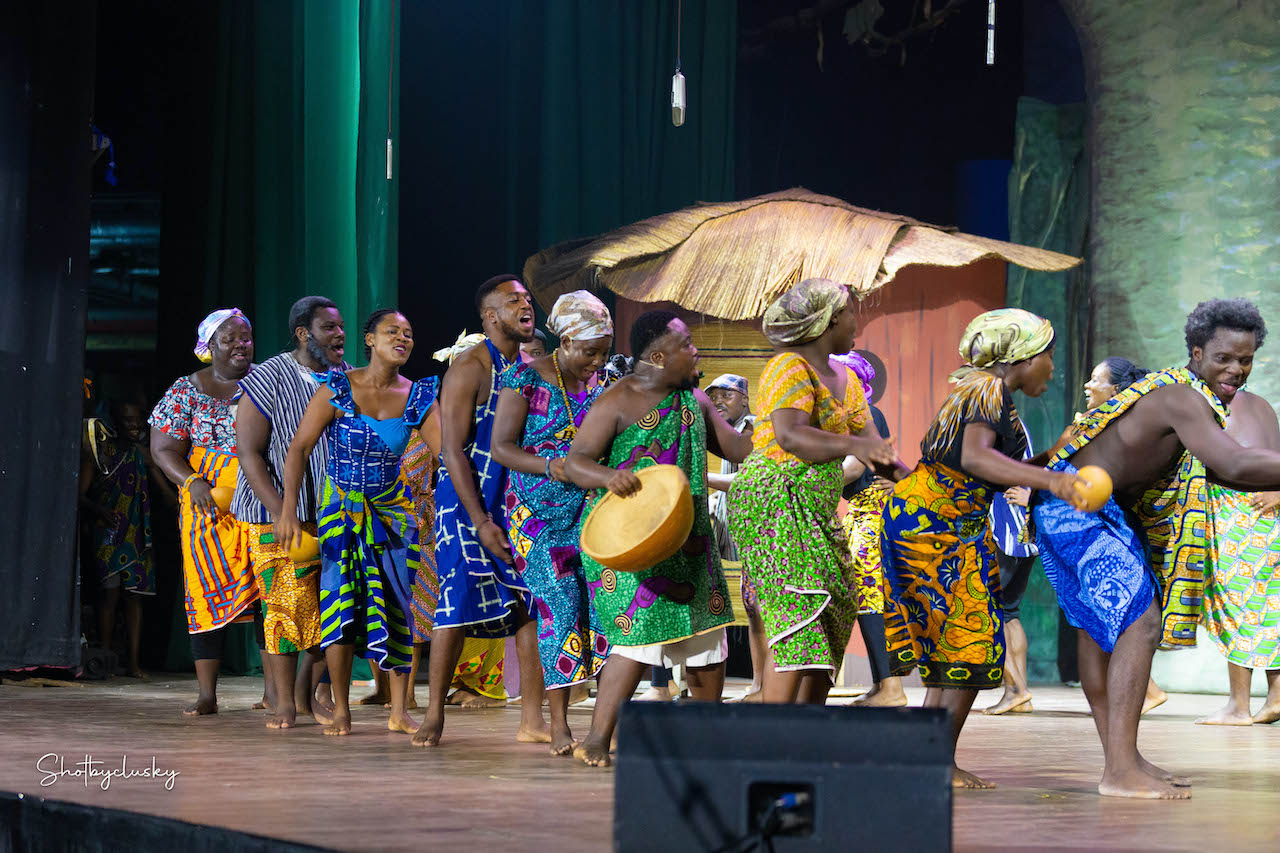
The idea of music as identity runs deep within the Ghanaian community. In our 2017 interview with JH Nketsia, he cautioned that composers should not lose their rhythm, because of how it defines us as Africans. During a short conversation with Prof. Agyemfra Tetteh hours before the premiere, he related a personal anecdote that illustrated how distinct musical styles identify one’s ethnic and religious background.
That Akotam is representative of Ghanaian society as the writer understands it is easy to see from the script. The musical, as enacted by Harmonious Chorale, brought its many details to life. And they were particularly suited for the task, being long-serving choristers with Ghana’s most high profile choir who know each other well enough to allow the hilarious intimacy of traditional village living to shine through their on-stage antics.
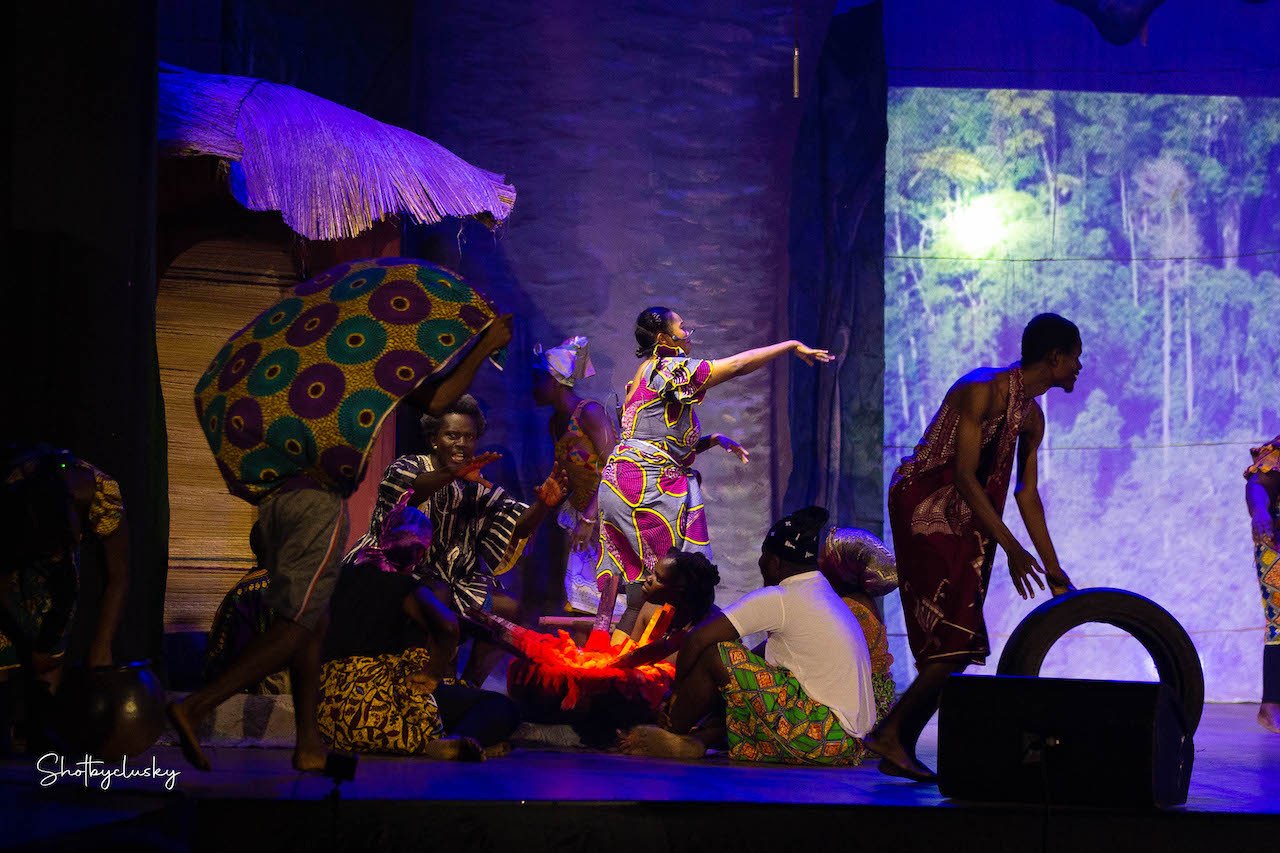
Like another good musical we witnessed some years ago, the story and its performance were in conversation with contemporary society in ways that allowed it to be relatable to the audience. Songs of Akotam did this with both music, dance and speech.
Of particular note to us were the Christian elements embedded in the story. The king of the village, Nana Mpotu, speaks of his daughter who was once lost, who had now been found. In the midst of the confusion of the village people, Ayeyi Yaw boldly claims that “the God he serves” will give him a song to use against the beast. Perhaps it would have been a little more fun to hear him speak of “the gods” who must themselves be capable of inventing a potent tune, but the successful infiltration of monotheist thought into Ghanaian spirituality is itself worth a comment.
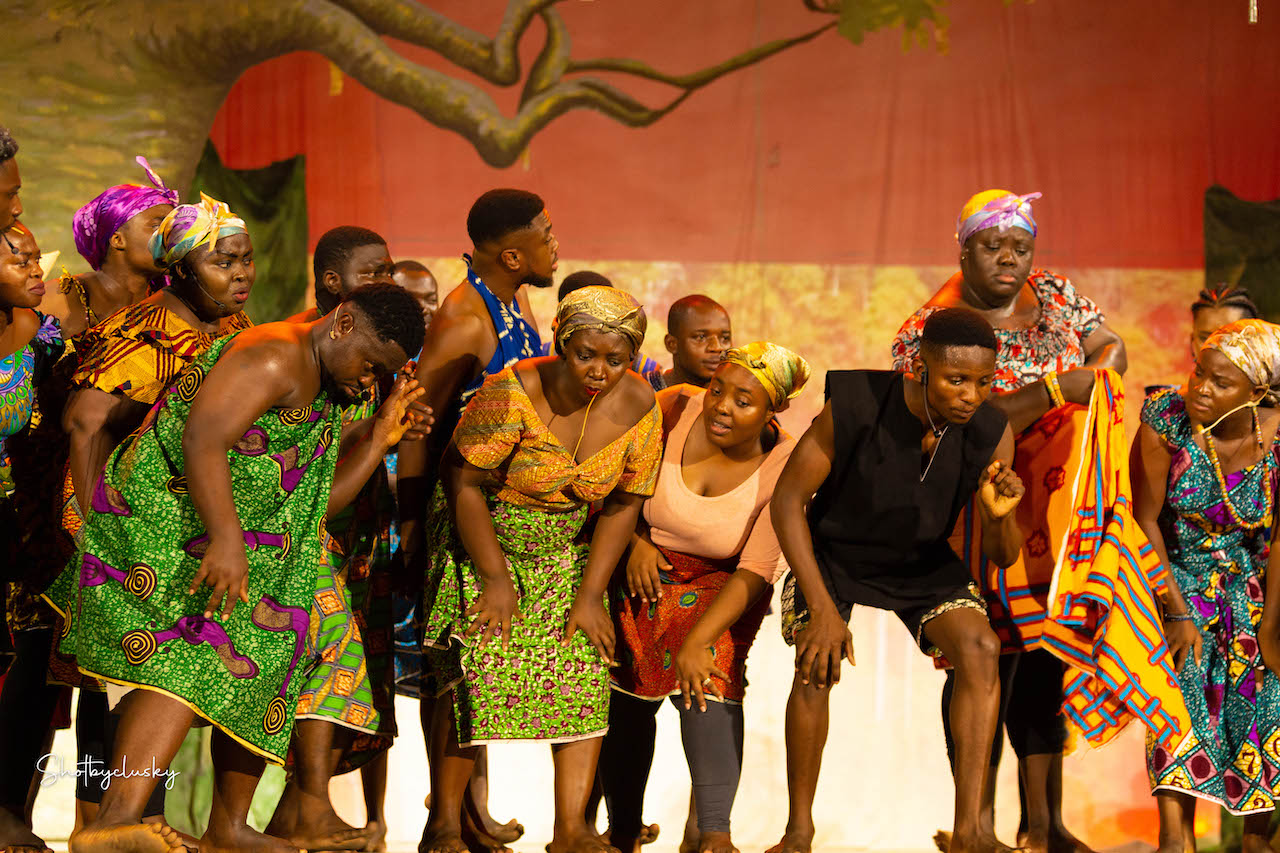
Perhaps ironically, the strength of Essilfie’s depiction of traditional Ghanaian society lies also in its unintentional (but effective) portrayal of a peculiar bigotry underpinning the happy face of contemporary Ghana, realised in the story of Kakum. The villain’s rejection of Akotam’s identity, his othering as a consequence, and the harsh justice he faces add another layer of meaning to the musical, and more richness to his character, and it marks Kakum as far more important to the story than his place in the narrative would suggest.
The final azonto chorus was a rapturous affair. Titled “Agorɔ yɛdɛ”, it featured traditional and contemporary Ghanaian, as well as Western classical influences, including a rather remarkable extended quote from Eddie Khae’s “Do The Dance”, the pop hit from 2018, and elaborate azonto choreography.
Songs of Akotam was a resounding success. It’s hard to pin down what appealed most to audiences in the run up to Sunday’s performance and during the show itself. The celebrity of George Mensah Essilfie and his return to Ghana after several years away must have drawn those who know and love his music to the National Theatre. The attraction of a major Harmonious Chorale event is something few people familiar with their work would want to miss. That this was the premiere of an original musical was certainly a point of interest for us as these are not a common occurrence, and we don’t doubt that a large section of the audience was eager to enjoy this.
Overall, a confluence of impactful factors must have led to one of the most well-attended shows of this sort we’ve had the privilege to see, which begs the question; how will the success of Songs of Akotam inspire choral directors, composers and show producers? That’s a story we’re looking forward to.
1 The Kalabashi Concert featured the following choirs performing music by Essilfie:
- The Symphonials, Ghana
- African Glorious Chorale
- Dynamic Choir
- African Youth Choir
- Windy Voices
2 The complete cast includes:
- Storytellers: Edward Opare-Addo, Genevive Enam Akpalu
- Ayeyi Yaw: Michael Ewusi Aboagye
- Kakum: Samuel Okpoti Nsiah
- Auntie Akosua Mansa: Amanda Efua Abrokwah
- Auntie Yaa Manu: Mavis Afua Opokua Asare
- Uncle Bobo: Thomas Nii Allotey
- Kooko wura: Hannah Adukwei Ankrah
- Nana Mpotu: Samuel Twum-Barima
- Queen Mother: Akosua Asantewaa Essuman
- Princess Abokuma: Mitchelle Ajeigbe
- Okyeame: Kwasi Boakye Otchere
- Village Elders: Charles Godfrey Cofie, Richmond Aryee Lakoussan, Kate Lamptey
- Okoto, the Palace Messenger: Victor Awubawuni
- Abokuma’s maids: Sarah Akuamoah Boateng, Adriana Hayford
- Stool bearer: Manson Kwaku Boateng
- King’s umbrella holder: Paa Kwesi Amponsah-Antwi
- Sika Kofi: Emmanuel Akowuah
- Ntim Nyansa: Michael Martey
- Ahoɔden Mensah: Moses Torto
- Village folk: Members of Harmonious Chorale-Ghana